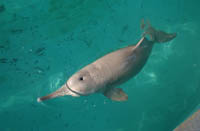
the Yangtze River dolphin, QiQi
The world's only captive Yangtze River dolphin, QiQi, died on July 14 at the Wuhan-based Institute of Hydrobiology (HIB) of the Chinese Academy of Sciences (CAS). At age of about 25, well advanced in years for a fresh-water dolphin, his death is considered as a natural one.
The Yangtze River dolphin (
Lipotes vexillifer), also known as the white flag (or Baiji) dolphin, and one of the world's five fresh-water dolphin species still existing, is considered a "living fossil." Scientists believe it made its first appearance on earth about 25 million years ago, and can now only be found in the middle and lower reaches of the Yangtze River. With an estimated less than 100 remaining, the Baiji is listed as the most endangered cetacean species in the world and designated as a protected animal of the first order in China, along with such animals as giant pandas and tigers.
In order to carry out studies on the species, in 1978, a research group was established at HIB. Over the past 25 years, with the support from CAS and governments at various levels, the group has developed into a major research arm of the institute in the field. It is the only cetacean research center in China.
QiQi, a male Baiji, was accidentally caught by a fisherman and sent to HIB in 1980, when he was about two years old. By raising QiQi over the past 23 years, CAS researchers have conducted research into such things as dolphin feeding, behavior, hematology, bioacoustics, biology of reproduction, and disease diagnosis and treatment. It was a remarkable feat to raise QiQi for up to 23 years and make him one of the most long-lived fresh-water whales in captivity, says ichthyologist Chen Yiyu, who is also CAS vice president. CAS scientists have contributed to study and protection of this rare and endangered species.
Although Qi Qi is gone, the work on the Yangtze River dolphin will not stop, asserts Dr. Wang Ding, deputy director of HIB. Rather, his death inspires us to speed up our efforts to protect his fellow creatures in the Yangtze River, before it would be too late. (Guo Haiyan)





